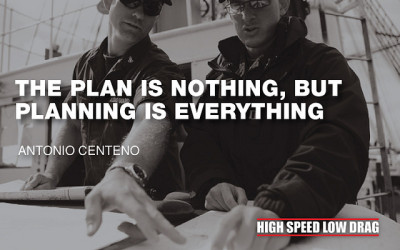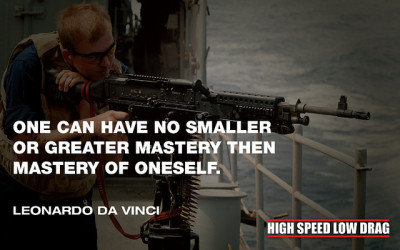 This post is based on the podcast – Pink Slips And Military Downsizing | How to Prepare In Case You Get The Boot.
This post is based on the podcast – Pink Slips And Military Downsizing | How to Prepare In Case You Get The Boot.
Tom: Hey, High Speed Nation, this is Tom Morkes here with Antonio Centeno of High Speed Low Drag. We want to welcome you back to another episode of the High Speed Low Drag podcast. How’s it going, Antonio?
Antonio: It’s going great, Tom. I’m excited about today’s topic because we were just talking about the news, and there are a lot of guys right now, as far as I know, just within the Army, but I did talk to a buddy of mine. He’s a commander now over in the Navy and he’s talking about — there’s just downsizing going on in the military. We knew it was going to happen. Everything is starting to wind down. The Commander in Chief, he basically said that the war on global terrorism is officially over.
Tom: Yeah. Actually, I have an article here from Fox News, the first thing that pops up when you search “pink slips for current military members”. Right now, it says that Pentagon is laying off thousands of military officers, including those serving or who have recently served in Afghanistan, as part of a larger plan to reduce the number of US soldiers from 520,000 to 450,000.
That’s 70,000 people they’re going to be cutting over the course of the next however many years, which is a pretty darn good chunk of active duty forces, and it’s going to be a lot of men and women coming back from overseas and —
Antonio: Well, it’s bigger than that because it’s not like they’re going to stop bringing in new recruits. One of the ways that you keep costs down — I know the Marine Corps is frontloaded in the sense of — I mean, the average age of a Marine is much lower than many of the other services, so I think that they’re going to be cutting out.
It’s not going to be the E3s that are getting cut out because a lot of those guys naturally transitioned out. What we’re seeing is a lot of senior listed, a lot of middle — basically, mid-officers and senior officers are going to be seeing the door.
Tom: Yeah. In this case, it’s specifically highlighting or saying a lot of captains are getting the boot right now, so it’s not the best situation for these guys if they’re considering like, “I want to make this a career. I’ll be there and do this for the next 20 years of my life.” All of a sudden, that’s been cut out. The rugs have been pulled off from under them. That’s not an option anymore.
Now, these guys who will be getting out, what would they do? What do you do if you get that pink slip I guess is the question. I think it’s something that we ought to talk about today.
Antonio: I think we will. We’re going to talk specifically to the guy that’s getting the pink slip. We’re assuming that you’ve got, let’s say, 12 months, but let’s even cut it back. You’ve got maybe six months. What can you do in the time period you have and start getting ready for basically the civilian world that’s coming out?
I’ll go ahead and start off. What I would say is to start now, to treat it like — do not wait until the last moment. We’ve got that great saying, “The more you sweat in peace time, the less you’ll bleed in war.” It’s one of those things. You start now and you start figuring it out. “Okay. We’ve got a year,” “We’ve got six months,” especially if you’re a family man.
We’ve got a checklist, by the way, that we’re going to be caught reading some of this stuff off of. If you go to highspeedlowdrag.org/list101 — and we’ll have links to it in the show note — but if you go this, we’ve got over a hundred items of things that you should be thinking about from admin to medical to networking to presentation.
One of the first things that you need to start doing is just getting yourself in order and I’m going to say basically starting to get all your expenses in check. My last year and a half as a US Marine, I did a pretty good job of looking at where can I cut expenses and how can I save money, and I came out with a sizable amount of money saved up, which I was able to use as a leverage to be able to do what I wanted to do.
I went and lived in Ukraine for a year off of those savings, but I know for a lot of guys, they don’t have a lot of money necessarily saved up. That’s something that you want to cut expenses. Be ruthless. When you go on deployment, cut the cable.
Perhaps you’ve got a family. It’s going to be less expensive to live on base. Perhaps if you’re a single guy, just consider living with family. I lived with family in and around Pendleton my last year I was in the Marines. Yeah, I drove a little bit more and it wasn’t always comfortable sleeping on the couch, but I saved a lot of money by doing that.
Tom: Yeah, and I’m a big proponent of cutting back expenses. I just cut out everything that was essentially, in my opinion, unessential. I’ll be like, “TV, I don’t really need that.” Netflix, you don’t really need that. These small things, they actually do add up quite a bit, so I think that number one is cutting back expenses.
I’ve heard this suggestion, which I think is a pretty good advice, the idea of looking to have at least six months of savings backed up before you quit your job. In the context of what we’re talking about here, it’d probably be a smart idea to try to get your savings or your checking account up to about six months of paychecks going forward so that when you do have to leave, you have that safety net as you get out.
 Antonio: Yeah. It’s something that when you’ve got that money in the bank that you are taken care of and you’re not bleeding. You don’t have those big expenses. Don’t be looking to purchase a new car. Don’t be looking to buy that new house. Those are great things, but with you with an unsteady amount of income coming in, this is the time when you start cutting back. It’s better to buy a used car from sites like https://bluffusedcarscolumbiasc.com/ instead of a new one when this time comes.
Antonio: Yeah. It’s something that when you’ve got that money in the bank that you are taken care of and you’re not bleeding. You don’t have those big expenses. Don’t be looking to purchase a new car. Don’t be looking to buy that new house. Those are great things, but with you with an unsteady amount of income coming in, this is the time when you start cutting back. It’s better to buy a used car from sites like https://bluffusedcarscolumbiasc.com/ instead of a new one when this time comes.
You’ve been buying that $5 bottle of shampoo. Let’s go back to that $1 stuff over at Walmart. You want to cut every expense. Make a game out of it. We’re linked to some other resources. There are people that talk about money who are a lot smarter than me.
Jeff Rose over at “Soldier of Finance”, a former Army guy, a great friend of mine, he’s written an entire book on how to basically get your savings in line. This is a guy that has kids. He knows what he’s talking about. Those are the kinds of people you want to be seeking out.
The number two thing, Tom, I would say is change your mindset. I was a captain in the Marines. I had a certain mindset of my place in the world and I was very proud. I am still very proud, but I think one of the big things for guys that are getting out of the military, is we are used to being on top of the world. Literally, what we were doing was we were in countries creating policy. We weren’t just reading the news; we were making the news. Things are going to change a bit when you’re out in the civilian world.
Tom, do you want to talk about that?
Tom: Yeah, for sure. I think you hit the nail on the head that when it comes to mindset — and this is such a broad topic — I think to begin with though, for anybody getting out, you have to think — I think we all had quite a bit of self-importance to the degree of what we did in the Army, especially probably officers, but anybody who led troops and anything you did, you do have such a dramatic impact on real life events, right? You said you make the news, for sure.
You’re not going to get that when you get out in the civilian world. It’s going to be pretty — I don’t know if any other profession or any other job has anything close to the amount of the level of importance and scale or magnitude that active duty in the military does.
I think change in the mindset is just a matter of looking at it and saying, “You’re not going to be King Ding-a-Ling anymore.” You’re going to have to come back down to earth and realize that you’re not going to be somebody who’s essentially — I won’t say “looked up to”, but you’re not going to be the most important person in the world, which you are in a lot of cases.
Antonio: Or it seems like it. When you’re a company commander and you’ve got that entire company — you’re First Sergeant. You’ve got those gunnies. You’ve got all your lieutenants. You’ve got your little kingdom until you have to go see the battalion commander, and then you realize, “Yup, I’m just a part of the system.” And then when you’ve got to see the regimental commander, then you realize that even the battalion commander — and so, there always was that you had people to report to.
I just want to be clear, Tom, that neither of us are advocating that you are any less important, but you’re going to have to make sure that you don’t take that ego out with you because it is something that can be looked on very negatively in the civilian world, and it’s something that people just don’t even know how to deal with, but I have seen many men go out and still do amazing things, still influence the world.
My friend, Jake Harriman, he runs Nuru International. They go into Africa, they choose villages, and they help them create sustainable farming. They basically make loans to buy fertilizer and they increase crop yields. This transforms entire villages within one to two years, and then they can move on to the next village because what they’ve created is a sustainable system.
Now, Jake was a former special operations Marine captain. This guy was jumping out of helicopters on two ships off the gulf. He was one of the Marines that I look up to as a fellow officer and I was always amazed. He went to the Naval Academy — I know your favorite school, Tom. He was just doing amazing things and he’s still doing amazing things.
One of the secrets to Jake’s success when I look at him is that he checked his ego. He’s a servant leader. He puts his team in front of him. He’s got a very different team now. They’re water experts. They’re team members, people with — they’re super smart people that can go in and help make sure the water’s good, that they’re setting up systems for education with the local schools there in Kenya.
It’s a very different team than what he managed when he was in the Marines. He’s not jumping out of helicopters. Now, he’s tilling fields, but you know what? He’s still changing lives. It’s just a mind shift change. That’s what we’re really focused on here.
Tom: Yeah. I think part of that though, too, is recognizing that — you’ve mentioned it or you’ve touched on it, at least — is that hierarchy isn’t going to be there anymore telling you exactly what to do, and recognizing that success in the civilian world, at least from my perspective or from my experience as limited as it has been, is recognizing that now the entire world is at your fingertips when you get out. You have quite a number of options. Everyone does, but I think veterans in particular have so many skill sets that they bring to the table and so much potential.
We talked about myths in a prior episode, veteran myths. One of the things we talked about was the idea of thinking inside the box. They’re disciplined and they’re regimented and they only think inside the box. We dispelled that myth by saying no. Actually, you learn how to think outside the box. You learn how to be creative and figure things out.
I think that’s one of the greatest assets that these veterans will bring to the table actually when they get into the civilian world in the United States, and potentially the ramifications would be very positive, I think, for the US in general because I think what you’re going to find is a lot of people who are ready to become entrepreneurs or start their own businesses and legitimately look outside the box that way.
I think that’s another thing to consider, too, is to recognize that you have a lot of skills sets if you’re getting out, and they might not be immediately applicable or translatable to civilian world like attributes, but you can still apply the same strengths that you learned in the military to defining the job that you truly love or to building your own from scratch.
Antonio: Sounds good, man. Now, I’m going to give a very practical piece of advice, and that’s to get your medicals in order. Let’s just start with simple medical exams. If you’re a year out, go and get checked out by the doctor. If there are surgeries that you’ve been putting off because you’ve put your unit in front of yourself, at some point, you know you needed to get surgery on your knee or on your elbow, or you’ve got perhaps this strange bump that’s on your arm. It may be non-cancerous, but you need to get that removed because it could give you fits a couple of years down the line.
This is when you want to start saying, “Now, I need to start taking care of myself. I need to make sure to get in there.” Within a couple of months, schedule it out. Put up a reminder you need to get your final medical exam. Ensure you get copies of all of your paperwork because I know for five years after I was out, I carried my medical records with me everywhere.
No one does as great of a job, it seems like, as going into as much detail in our medical history and everything as the military does when you’re in, so make sure you’ve got that. That’s valuable information and it will cost you a lot of money when you get out to get that done.
 Tom: Yeah, also dental work and all that stuff, too. That’s under that same umbrella there. Every chance you get for those last few months, milk it for all it’s worth. Get it. That’s what I did, and it was helpful for that first year of getting out knowing I don’t have to worry about my dental or I don’t have to worry about my medical check-up and all those other stuff, and making sure I’m all good to go for the next few months.
Tom: Yeah, also dental work and all that stuff, too. That’s under that same umbrella there. Every chance you get for those last few months, milk it for all it’s worth. Get it. That’s what I did, and it was helpful for that first year of getting out knowing I don’t have to worry about my dental or I don’t have to worry about my medical check-up and all those other stuff, and making sure I’m all good to go for the next few months.
Antonio: Start sooner than later because there are wait periods. You may find that you need a full root canal and that may take two or three times into the dental office, and you don’t want to in a sense have to extend your stay or have a move delayed because it’s like, “Gosh, I’m going to miss this by a couple of days.”
The sooner you can get that stuff done, the sooner you will be — it’s one less thing to worry about. If you don’t have to get your teeth examined for a year after getting out, it’s hundreds of dollars you’ve just saved right there.
Perfect! All right. Well, let’s go ahead and talk about something maybe a little bit more ambiguous. Let’s get into some philosophy. We don?t need to talk about why you’re getting out because you’re basically getting a pink slip, but when was the last time you really thought about what you want to do with your life?
I was a philosophy major. I double majored in science and philosophy. I got this strange mix called “Origins of Behavior”, but in any case, the point is what did you want to do when you grew up? Being a lifelong soldier or sailor at this point doesn’t [0:16:16] [Indiscernible] in the cards. You may be able to pull it out, go to reserves or something like that, but being active duty with a pink slip just isn’t going to happen.
So, what else is out there? I know that many of us, we go down a certain path and we forget to look and we get so busy with life. Take time to think about it. “Who do I admire?” Don’t just think hypothetically about what you want to do and please do not go down the path of, “What’s going to pay me the most amount of money?” Don’t do that.
Start thinking about, “Who do I respect and who is successful that I know in the civilian world?” If you can’t answer that question, you need to start working on answering that in the next month and you need to start going to events.
Tom, you’ve got a great story. You’re active duty, and where did you go?
Tom: Yeah. I went to Seth Godin’s Revolution Conference. He’s put that on. He rarely puts on events. It seems like maybe once or twice a year, but it’s pretty rare. It was just one of those weekends that he put it on. Essentially, he emailed us and he mentioned, “I’m going to be having this conference. It’s going to be this and this time in the next month.”
I remember looking at my calendar. That’s a three-day weekend or something like that for me, so I was like, “I’m going to buy tickets and I’m going to go to that.” That was me reaching out just to — and I had no business at the time. I had no reason to really be at this conference. I know “conference” is a wrong word for it because it was really just this intimate meet-up with a bunch of small business owners and stuff like that because I didn’t own a business. I was there literally just to learn to connect.
Since then, I’ve made really good friends with some of the people I’ve met there, whether it’s Clay Hebert and Al Pittampalli, great guys that got me started blogging and podcasting really. That’s where it started for me essentially. I’d started a little bit before them, but again, those kinds of connections, one thing stemmed to another.
Each one of these guys that I met and became friends with, they connected me with other people and so on and so forth that I could probably track my connection to you, Antonio, through all the way back to these guys where I started and even be on them. So yeah, I think it’s just fascinating when you try to connect the dots that way and realize that so much of the opportunity that’s out there correlates with how many people you know and how many real relationships you’ve built up. For me, it was and it still is for me a priority, is always just connecting with people and trying to be around people that I admire and that I respect.
Antonio: So if you’re 12 months out or if you’re six months out, your journey in the civilian world does not begin in six months or in 12 months. It begins now. There is no rule against you simply — yeah, your unit may have things for you to do, but you also are going to have to take a stand and realize, “Hey, I have to take care of myself.”
Again, you definitely have to work this out with your chain of command and with your unit and everything, but you should be afforded time to be able to at least take a weekend and fly to a conference that is in an industry that you seriously consider pursuing or going down so that you can start making connections now, and you are going to have this unique advantage.
Tom, how did people react when they find out who you were and what you were doing?
Tom: From the conference when I went there?
Antonio: Yeah.
 Tom: They were pretty impressed actually. I think most of them were a little surprised by it. Maybe a few of them were a little confused. They’re probably going to say, “Why are you here?” but I let them know because at the time, I was in an airborne unit, so we were jumping out of helicopters and airplanes and stuff like that, so it was cool.
Tom: They were pretty impressed actually. I think most of them were a little surprised by it. Maybe a few of them were a little confused. They’re probably going to say, “Why are you here?” but I let them know because at the time, I was in an airborne unit, so we were jumping out of helicopters and airplanes and stuff like that, so it was cool.
They had you write down on a sticker what you do or something like that, or tell a story about yourself for your name tag. It was a kind of boring, old name tag, so I mentioned that I jump out of helicopters. That was again a great icebreaker so I could connect with people.
What’s fascinating, too, is coming out as a student, as somebody wanting to learn, I think people are always appreciative of that. And so, I try to still maintain that. I don’t consider myself an expert at all. I always would come at things as a student. So if I’m going there, I’ll connect and learn as much as I can. I think people really resonate with that and they will gravitate toward you in a good way.
So even if you’re nervous about going to something like this, which I definitely was especially going by myself, it’s just one of those things to keep in mind. People will really appreciate you for doing it and you’ll make some really great connections, and that’s so important. I can’t stress that enough.
Antonio: Yeah. You were memorable. That’s one thing I would say. You show up there. You’re striking. They’re going to remember you and that is so important. We go to so many conferences, we go to so many events, and I forget. Half the guys are trying to sell me [0:21:08] [Indiscernible] or tell me about this new multilevel marketing thing. That’s what we see in a lot of them.
You’re going there simply with an open mind. “I’m serving. I’m an active duty sailor in Hawaii over at Pearl Harbor, but I’m transitioning out. I’ve still got six months up to my contract, but I’m here to learn because to be honest, I’m looking for people that inspire me.” That right there, it’s like — wow!
You’re not trying to sell me anything. You’re simply here, plus you’re protecting me. You’re serving the country right now. You’re active duty. I would advise in most cases not showing up in your uniform because you don’t want to push it on people, but you do want to say, “I’m an open book. I do have a focus, but at the same time, I am looking to meet people and to connect.”
That’s going to give you, I think, a much — it’s going to really help you determine what path do you want to go down so that you don’t make the mistake because I’ve seen a lot of people that they get out, they get a job, and they go after it for the money. They wake up five years later and they go, “What in the world am I doing? My entire family is five years older. I see less of them than I did when I was active duty military. This isn’t the life I wanted.”
Tom: Yeah. It’s funny — and if there’s another point you want to hit, we should definitely do that, but I want to touch on this real quick and say from my own personal experience that when I was getting out, the thing that seemed like the best option that people promoted was going with a recruiter.
I remember thinking — I did talk to some recruiters and I definitely think there’s value in recruiters and recruiting firms. I definitely think so. I know there are probably good positions you can get especially if you’re an engineer or something like that. It seemed like they always had the best job offers. For transportation, there’s a good selection, too.
It was one of those things, too, that I just didn’t really want to be middle manager in a corporation. I just did not have that interest. My interest is more maybe in the tech world or the tech startup world or doing something like that, being an entrepreneur or building my own business. I didn’t know exactly what it was, but I knew I wanted to essentially do my own thing or be in a small team. So, what do you do, right?
For me, I couldn’t go with a recruiter because a recruiter is not going to connect me with a tech startup. They don’t do that. So for me, it was just a matter of self-education. Recognizing that these recruiters are not going to get me this job that I might want or be totally interested in and I don’t necessarily have the “skill set” to work at a tech company or whatever, or even start my own thing, where do you start? For me, it was self-education, so I’ve always been about that.
I’ve been trying to educate myself as much as possible and then trying to put that education to work, so whether it’s building websites, trying to design my own courses or writing my own books and sell those or publish other people’s books and stuff like that. It’s just been one thing after another, the studying, learning, and then applying.
Now, a year later, I do have the skill sets if I wanted to get a job. That was more consistent if I wasn’t happy doing what I’m doing right now, but if I want to get a job, I’d have all these new skill sets that I’ve learned just over the course of last year from I’m doing it, but that’s something you could start now. Anybody could start now.
 Antonio: Yeah. I think that’s a great place to end it, Tom, is really just getting in there and doing the self-education. I remember being on deployment and being on that boat and having nothing else to read. A buddy of mine, he was reading the whole “Rich Dad, Poor Dad” series. I started reading it. I’ve never even heard of investment real estate or the best real estate investment groups before reading the books.
Antonio: Yeah. I think that’s a great place to end it, Tom, is really just getting in there and doing the self-education. I remember being on deployment and being on that boat and having nothing else to read. A buddy of mine, he was reading the whole “Rich Dad, Poor Dad” series. I started reading it. I’ve never even heard of investment real estate or the best real estate investment groups before reading the books.
A lot of the stuff — I don’t know how legitimate it is in those books, but I will say that Robert Kiyosaki, he did get me all of a sudden thinking about what it means to be an owner versus a worker. I do have to say I learned it in those books, just rereading them, and it just blew my mind. Coming from the type of worker background, everyone in my family had always had hourly jobs.
So to realize that you could do something and not actually get paid by owning something versus actually working on the business or in the business, it was like — wow! You could just be an owner and in a sense just let it run by itself like a clock. It just blew me away.
We’ve got some great courses in communities over at High Speed Elite, which is our private community where Tom and I hang out, along with John Dumas of Entrepreneur on Fire, all of us veterans sharing our best. You have to put in a bit of an investment for that.
You can make no investment. One thing I used to do is actually take a thermos of coffee. This is about the time when I was transitioning out living on my sister’s couch. I would just go to Barnes & Noble and simply take my own thermos of coffee. I was so cheap. I wasn’t even buying coffee there. I would just go through the bookstore and find five to ten books that I liked and I would just plant myself and read and flirt with girls, but also be reading. It was nice scenery. So I’d be sitting there reading and having a great time and opening my mind up to all these different things.
It was a great discovery period. Use it, but also set deadlines. Set those concrete goals. Guys, again, if you want more from our Transition Success Checklist, over a hundred items, go to highspeedlowdrag.org/list101. It’s there waiting for you. It’s free. You’ve got to give us your email so we can send it to you, but it’s there for you to use and to share, and I highly advise you to grab that.
Tom, I think that’s about it for today. Hopefully you guys are enjoying these podcasts we’re doing here at High Speed Low Drag.
Tom: Yup, sounds great! If you guys have any questions or any topics you’d like us to cover, please reach out and shoot us an email, or just reach out on iTunes and ask a question there if you’d like. Of course, leave a review if you enjoy what you hear.
Veterans, your education doesn’t stop here. Go to highspeedelite.com to join the exclusive Veterans Mastermind that will give you the unfair advantage to succeed in both business and life. We have dozens of training courses, HD videos, a private Facebook group, and the chance to interact daily with John and other successful veteran entrepreneurs every month on live hangouts and webinars.
High Speed Elite is more than a mastermind. It’s your ticket to the land of success.
Are you prepared to ignite? Go to highspeedelite.com today to find out more.
